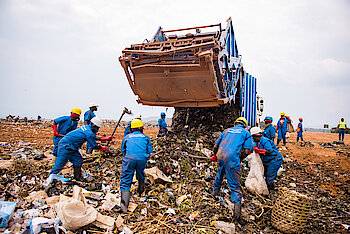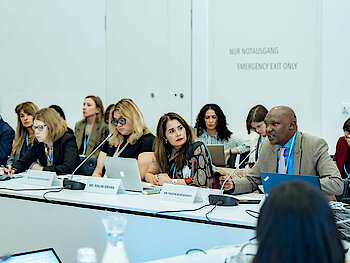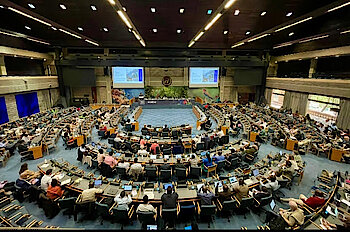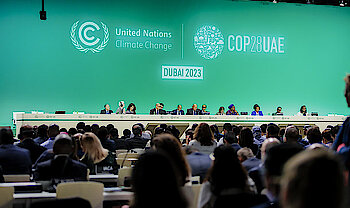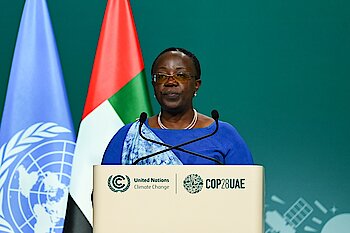
Coronavirus responses proves the World can act on Climate Change
The COVID-19 pandemic has provoked a global response unlike anything we have seen before. Governments have witnessed transformational changes that didn't appear possible in few months ago. The human costs of the pandemic are horrifying, but the response has largely been characterised by care, compassion and connection.
People are more afraid of the Corona-virus than the progressive climate change, including the increasingly rapid global warming process, because climate change is however much slower than the growing coronavirus pandemic. The effects of the development of the COVID-19 pandemic are already visible in a significant part of the world.
Currently, the number of human infections is growing rapidly every day. Many people have already died of the Coronavirus. Serious economic effects are already visible. However, the global warming process is so slow that most people do not pay attention to very slow climate change. In contrast, climate disasters occur only locally and in most countries very rarely, so most people learn about the effects of climate change from the media and not from the immediate environment and experience.
At this frightening stage of the crisis, it is very difficult to focus on anything else, but the people have to bear in mind that COVID-19 is voidable and temporal. Currently, measures aiming at stopping the spread of coronavirus were put in place and they are dominant or paramount compare to climate actions which were talked about many years ago.
By taking the strong measure, what really matters is the same for all countries, health and safety of their citizen is a major concern and that’s what the coronavirus threatens, and that’s exactly what climate change does, too.
Climate change was declared as global emergency, yet to date the world has largely failed to address it. In contrast, the global policy response to the coronavirus emergency has been fast and furious. For instance, many countries have stopped transport either private and public, and advise se people to stay at home in order to stop the spread of COVID-19. Though we do not suggest the countries to take the same measures, but there are several reasons learned from these approaches that can be adopted to tackle climate change as one of with serious threats to people and planet.
Important lessons drawn from the current health crisis
The response to the pandemic illustrates actions we can take to address the global climate change crisis
1. Political will
A global response to coronavirus crisis shows that governments can take immediate, fundamental emergency measures, which go beyond purely economic concerns, to protect the well-being of people and the planet. If UNFCCC member States join the will like the way they reacted against COVID 19, we can tackle climate change.
2. Act early
COVID 19 outbreak shows the crucial importance of early action to prevent. Governments which took the early preventive measures like quarantine and screening measures, have relatively small numbers of infections compare to the Governments that delayed to act. Climates actions have to be taken into account early to avoid the future catastrophic consequences.
3. Avoiding the unnecessary movement
Coronavirus has forced an immediate scale-down of how we travel and live. People are forging local connections, shopping locally, working from home and limiting consumption to what they need; this has led to the reduction of CO2 emission.
4. Considering climate change as global urgent
It has been observed, that the people do not complain when the immediate measures are taken to save their lives. When it comes to the climate change, countries do not act accordingly, because climate change is the slow increase in global temperatures. Humans can psychologically adjust as the situation worsens, making the problem seem less urgent and meaning people are less willing to accept drastic policy measures. If we consider climate change as an urgent issue, any measure taken by the governments people will comply with it and they will also respect the recommendations from scientist.
5. Shift from unsustainable to sustainable economy
New economic thinking is needed. A transition to sustainable regrowth can help. Governments need to shift global attention from GDP as an indicator of well-being, towards other measures that put people’s health, environment and planet in the first place.
The current unintended economic slowdown opens the door to such a transition, which would bring myriad benefits to the climate. Countries may build on this situation and propose a slowing of growth in sectors that damage the environment, such as fossil fuel industries, until the economy operates within Earth’s limits.
All this shows that a large-scale response to a global crisis is possible. UNFCC member States need to harness this wave of compassion and proactivity to protect vulnerable people in all contexts, including those most exposed to climate impacts.
Topics
More posts
Rwanda to embark the development of Short-Lived Climate Pollutants Plan
Image: Nduba Landfill in Kigali City, (The landfll is known as one source of methane gas which is the greenhouse gas and the short lived pollutants);…
RWANDA’S NEGOTIATORS ARE IN BONN PUSHING FOR CLIMATE FINANCE
Rwanda’s negotiators led by Mr. Faustin Munyazikwiye – Deputy Director General of the Rwanda Environment Management Authority (REMA) – are in Bonn,…
Rwanda and Germany launch the “Kigali Climate Talks”
On 9 May 2024, Dr Jeanne d’Arc Mujawamariya, Rwanda’s Minister of Environment, and Heike Uta Dettmann, Ambassador of the Federal Republic of Germany,…
Tackling Short-Lived Climate Pollutants: Insights from CCAC2024 Conference
The Climate and Clean Air Conference 2024 (CCAC2024), took place in Nairobi, Kenya, on the sidelines of the Sixth session of the United Nations…
RWANDA WELCOMES HISTORIC COP28 DECISION TO TRANSITION AWAY FROM FOSSIL FUELS
The Government of Rwanda has welcomed the ground-breaking decision made at the 28th Conference of the Parties (COP28) to the United Nations Framework…
NATIONAL STATEMENT - COP28 UN CLIMATE CHANGE CONFERENCE
Delivered by Dr Jeanne d’Arc Mujawamariya, Minister of Environment
To begin, I express my gratitude to His Highness Sheikh Mohamed bin Zayed…
Follow the UNEP Pavilion Discussion on the Role of Industry & Finance in Supporting the Adaptation Agenda at COP28
This session, which comes at the conclusion of Industry Day is designed to offer comprehensive insights into the roles of industry and finance in…
Rwanda to call for more ambitious climate action at COP28
At this year’s UN Climate Change Conference, known as COP28, Rwanda will call for more ambitious climate action, a doubling of funding for adaptation…
Rwanda Green Fund Celebrates a Decade of Impact
The Rwanda Green Fund has marked its 10th anniversary, a remarkable milestone of transformative impact in Rwanda. Established in 2012, the Fund has…
